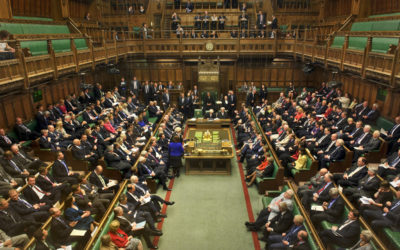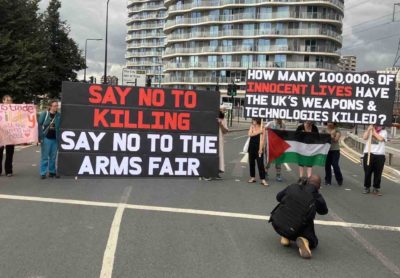#GE2019: security & defence
This #GE2019 manifesto for peace and security (90 seconds) from the Rethinking Security group gives an alternative vision of defence policy.
The 2019 General Election campaign is well underway with much of the debate focusing on domestic issues like inequality, education, healthcare and the UK’s future relationship to Europe. Clearly, these are key topics for many millions of people in the UK and each is deeply intertwined with questions of human security. Less remarked upon, beyond mudslinging from the Labour and Conservatives parties about whose leader is more of a security threat, are issues around defence, the military and foreign policy.
We decided to carry out a potted analysis of existing positions and manifesto pledges of Labour, the Conservatives and Liberal Democrats, the major nationalist parties and the Greens to try and unpack differences and similarities in policy. Much of this has been drawn directly from the party Manifestos but also useful is recent Chatham House foreign affairs debate which is worth watching for comparison on a wider range of international affairs, such as future relations to China and Turkey, which are not included here.
The Conservative Party
The Conservatives frame themselves as the traditional party of defence and have been in power for nine years under three different Prime Ministers. Since 2010, the Tories have overseen substantial privatisation, and associated crises, of areas like accommodation and recruiting, and have been slammed repeatedly about veterans welfare and mental health. They have championed changes in the law to end so-called ‘vexatious claims’ against UK troops from conflicts in Iraq, Afghanistan and Northern Ireland and founded a new department for veteran’s affairs.
The ruling party inherited the wars of the last Labour government in Iraq and Afghanistan, waged a new war in Libya with ongoing consequences, used air power, drones and special forces extensively, embedded military personnel in Saudi Arabia and other Gulf regimes, and has defended and extended Britain’s role in global arms trade.
On the major issues around defence and foreign policy the Conservatives have positioned themselves as follows:
- Trident renewal: fully committed.
- NATO: committed to the NATO guideline of spending 2% of Gross Domestic Product (GDP) on defence.
- Veterans: A railcard, pledge to change human rights law to end ‘vexatious claims’, guaranteed interviews for public sector jobs.
- Service personnel/military: Modernise equipment, improve training.
- Arms trade: Push on with big projects like frigates and armoured vehicles, making them in the UK. Foreign Secretary Dominic Raab argued at the recent Chatham House debate that laws governing sales to countries with authoritarian regimes, such as Saudi Arabia, were adequate.
- Military intervention: No significant change noted in manifesto, In Chatham House debate on international affairs, Raab was resistant to a War Powers Act which would give legal require Parliament a vote before military action.
Labour
For the first time the Labour Party has a statedly anti-war and anti-militarist leader with an overwhelming mandate from the membership. However the parliamentary party reflects the previous, and almost completely opposite, consensus reached under Gordon Brown and Tony Blair. This conflict is apparent in the last four years of clashes over all aspects of policy, but also in the foreign policy and defence sections of the new manifesto. For example, it pledges a right of return for the Chagossian islanders, which is a cause championed by the left for decades, and full implementation of the Chilcot Inquiry’s findings. At the same time, the manifesto promises to match the Conservative commitment to renew Trident and spend 2% of GDP on defence as per NATO guidelines. It lauds the UK arms industry while also pledging to rein in arms sales to authoritarian regimes found to be abusing human rights.
But while there are contradictions, there are also significant departures from old Labour policy. These include a War Powers Act, which would make a vote before military action a legal requirement, lump sum settlements for surviving nuclear test veterans and compensation for commonwealth veterans paid at lower rates than their British counterparts, and reducing carbon emissions from the military.
- Trident renewal: fully committed.
- NATO: committed to membership and spending 2% of GDP on defence.
- Veterans: housing, retraining and mental health support. Labour’s Pledges to the Armed Forces are compiled here.
- Service personnel: investment in accommodation, education and welfare. A pledge to consult on a representative body for the armed forces (in effect, a union without the right to strike). An end to the public sector pay freeze and to defence privatisation.
- Arms trade: Labour pledges to extend arms controls and apply more rigorous standards to arms licences.
- Military intervention: a War Powers Act legally requiring a parliamentary vote on military action and full implementation of the Chilcot Inquiry findings.
Liberal Democrats
From 2010 to 2015 the Liberal Democrats were in government with the Conservative Party of David Cameron. The Lib Dem foreign and defence policy was in line with the more dominant party during their time in power. Under their current leader Jo Swinson their manifesto pledges on these topics are broadly in line with the past. In this manifesto the party has tried to find a middle position on warfighting operations. They pledge to work to introduce a legislative requirement for MPs to vote on future military action while stating that they will preserve the government’s ‘ability to engage in action in emergencies or under treaty obligation without requiring parliamentary approval.’ The Lib Dems say they will recognise a Palestinian state while respecting Israel’s right to security, suspend arms sales to Saudi Arabia if necessary and work to revive the Iran nuclear deal. They pledge to campaign for a new international treaty on the ‘on the principles and limits of the use of technology in modern warfare.’
- Trident renewal: fully committed.
- NATO: spending 2% of GDP on defence.
- Veterans: support the armed forces covenant and ongoing efforts to improve veteran mental health.
- Service personnel: recruit STEM graduates as engineers and offer a £10,000 ‘Golden Hello’ scheme.
- Arms trade: stop sales to Saudi Arabia.
- Military intervention: campaign for a mandatory vote on armed action while ensuring the prime minister can use armed force without impediment when needed.
Scottish National Party
Key 2019 foreign affairs and defence manifesto priorities for the Scottish National Party include the scrapping of Trident nuclear weapons, better care for veterans and a review of the UK’s response to the threat of hybrid warfare and international controversies like that playing out in Hong Kong. They echo Labour’s position that Chagossian islanders should be allowed to return to their Indian Ocean home. The party opposes the current government’s policy on selling arms to authoritarian regimes and additionally pledges to oppose the proliferation of unused and spent munitions on Scotland’s many military firing ranges. Like the Lib Dem’s they favour a two-state solution to the Israel-Palestine conflict and want to reinvigorate the Iran Nuclear deal using the mechanisms provided by the EU.
- Trident renewal: fully opposed.
- NATO: no position in manifesto.
- Veterans: measures to promote inclusion and wellbeing and reduce homelessness. They pledge to ensure that Commonwealth soldiers can stay in the UK after service.
- Service personnel: create a representative body for the armed forces.
- Arms trade: SNP have been outspoken on arms licences to human rights abusing nations.
- Military intervention: no position in manifesto.
Green Party
The Green Party aims to cancel the Trident nuclear replacement and have the UK sign the UN treaty on the Prohibition of Nuclear Weapons to work towards total elimination of nuclear weapons. They have pledged to replace the Ministry of Defence with the Ministry of Security and Peace, ‘making the promotion of peace a key foreign policy objective and linking the role of the defence services more closely to the world we now live in’. They also propose to close down the Defence and Security Organisation (DSO), a government department which facilitates arms deals, ending subsidies to the UK arms sector, as well as stop arms sales to authoritarian regimes.
- Trident: committed to disarm.
- Arms trade: stop arms sales to authoritarian regimes, or go further and close down the arms trade and end government subsidies.
In addition to the manifesto, the Green Party has also committed to a detailed range of other peace and defence policies, including raising the age of recruitment into the armed forces to 18!
Plaid Cymru
Plaid’s focus, as with all of the nationalist party’s is on the impact for their own nation of future policy. Alongside the Green Party they pledge to raise the recruiting age to 18, they oppose Trident renewal, want better veterans support and would see the military’s various Welsh-affiliated units relocated to Wales. They support a full vote on intervention and have been outspoken about stopping arms to the Saudi regime.
- Trident renewal: opposed, and also reject attempts to relocate nuclear weapons to Wales.
- NATO: deciding membership is not a devolved power.
- Veterans: better health provisions.
- Service personnel: relocate Welsh regiments to the country.
- Arms trade: opposed to arms sales to Saudi Arabia for use in Yemen.
- Military intervention: supports a vote in parliament before military action.
The Democratic Unionist Party
The DUP manifesto focuses on policies that affect Northern Ireland but also take a UK viewpoint. The party claims there has been a loss of coherence in defence policy and calls for a long term defence approach which upscales anti-terror measures and improves care for veterans. They support spending 2% of GDP on defence as per NATO guidelines and want to expand cyber-security provision.
- Trident renewal: full support.
- NATO: supports membership and spending 2% of GDP on defence.
- Veterans/service personnel: strengthen the military covenant, end legacy allegations and extend crown protection for troops.
See more: legislation & policy, election
Like what you read?
> Sign up for our newsletter or blog notifications
> Support our work – from just £2 a month









